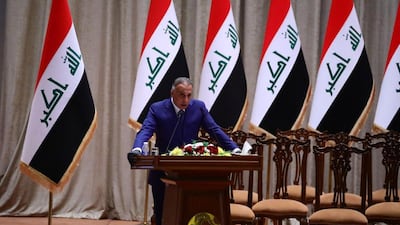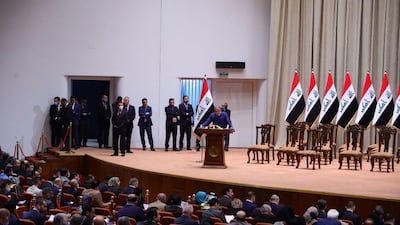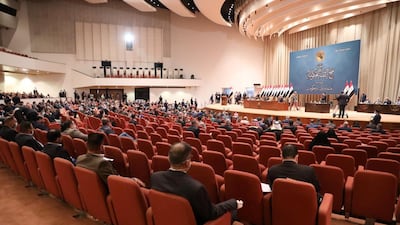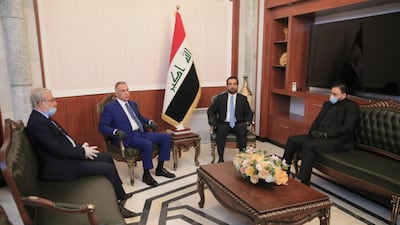Iraq's new Prime Minister has secured the backing of Parliament but the challenge of forming his government is not over, with the key posts of oil and foreign ministers vacant after MPs vetoed his nominees.
Parliament early on Thursday morning approved the new government led by Mustafa Al Kadhimi but there were last-minute changes to the Cabinet line-up and five positions remain empty.
The changes were an attempt to placate divided political factions and secure the vote before Mr Al Kadhimi's mandate expired this week.
The former intelligence chief was nominated by President Barham Salih in early April and is the third man asked to try and replace former premier Adel Abdul Mahdi.
Mr Abdul Mahdi stood down late last year during bloody nationwide demonstrations against corruption, mismanagement and unemployment.
Fifteen of Mr Al Kadhimi's proposed ministers passed the vote out of a prospective 22-seat Cabinet. Five names did not make it.
The oil and foreign ministries, the most important of the remaining portfolios, will remain vacant until further negotiations.
The plummeting global oil price has depleted the state budget at a time when Iraq faces economic crisis, despite vast petrochemical reserves.
Talks between Opec and other major oil and gas suppliers have led to an agreement, but more talks are still likely.
It is unclear what the result will be for Iraq without a minister to lead its position.
Mr Al Kadhimi's government program vowed to address the "consequences of the current economic crisis caused by the decline in oil prices".
There is going to be a lot of negotiations between the political blocs on this issue and the process could take weeks if not months, Sajad Jiyad, an analyst in Baghdad, told The National.
The appointment of an oil minister will be crucial in maintaining production levels.
“From what was said, the prime minister has agreed to nominate a minister of oil who is from Basra, so that reduces the field of potential candidates," Mr Jiyad said.
"But it’s a very important position and there will be a lot of discussion between the parties before this is agreed on."
The problem of naming a foreign minister lies with another crisis in which Iraq finds itself – the continuing tension between Iran and the US.
Since the US invasion of 2003, Iraqi politicians have had the unenviable task of balancing relations with Washington and neighbouring Tehran.
Iran has deep economic and religious ties with Iraq but is under sweeping sanctions imposed by US President Donald Trump.
Tension between the two heightened in recent months after the US killed top Iranian general Qassem Suleimani near Baghdad's airport in early January.
It triggered a series of retaliatory attacks in Iraq between the two.
Mr Jiyad said he expected a senior Kurdish politician to keep the foreign minister post.
Initially, departing Finance Minister Fuad Hussein was expected to take the position but his appointment fell through.
“I don’t think the prime minister will be wanting to get into a fight over that position but will expect the Kurdish Democratic Party to agree with the other blocs on a candidate,” Mr Jiyad said.
Mr Al Kadhimi's vote of confidence on Thursday morning was in response to weeks of political lobbying by all sides on the deeply divided political parties in Parliament.
They include those with close ties to Iran, who had been wary of the new prime minister's relations with the US.
The US and Iran welcomed Iraq's new government for ending months of political instability.
US Secretary of State Mike Pompeo congratulated Mr Al Kadhimi in a call and discussed "working together to provide the Iraqi people the prosperity and security they deserve", the State Department said.
"Now comes the urgent, hard work of implementing the reforms demanded by the Iraqi people," Mr Pompeo said on Twitter.
"I pledged to help him deliver on his bold agenda for the sake of the Iraqi people."
The US also plans as a gift to the new government to extend a sanctions waiver that allows Iraq to continue buying electricity and gas from Iran to meet power needs.
The 120-day exemption is the longest stay the US has granted Bagdhad in some time. and gives breathing room to Iraq to find alternatives.
Iran's Foreign Minister, Javad Zarif, also congratulated Mr Al Kadhimi and said Tehran would "always stand with the Iraqi people and their choice of administration".
Tehran and its allied Fatah political bloc in Baghdad had tried to veto Mr Al Kadhimi's appointment.
Last month, Kataib Hezbollah, an armed group close to Iran, accused Mr Al Kadhimi of having blood on his hands for the deaths of its leader, Abu Mahdi Al Muhandis, and Suleimani.
The group, linked to the Iran-backed Popular Mobilisation Forces, also accused him of collaborating with the US.










